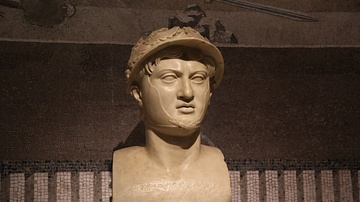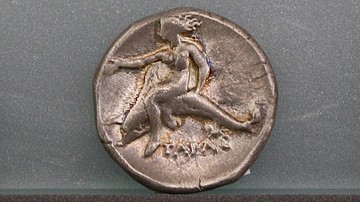Search
Remove Ads
Advertisement
Summary 
Loading AI-generated summary based on World History Encyclopedia articles ...
Search Results

Definition
Pyrrhus - The King with Costly Victories
Pyrrhus (also Pyrrhos or Phyrrhus, c. 319 - 272 BCE ) was the king of Epirus in northern Greece between 306 and 302 BCE and again between 297 and 272 BCE. Winning great victories against the armies of Macedon and Rome, he is considered one...

Image
Pyrrhus
A marble bust of Pyrrhus, King of Epirus (r. 306 - 302 BCE and 297 - 272 BCE). Pyrrhus is considered one of history's greatest military commanders. (National Archaeological Museum, Naples)

Article
Roman Warfare in the Age of Pyrrhus
The Roman army fought many conflicts throughout its long history, though perhaps none so indelible as the Pyrrhic War from 280 to 275 BCE. This war between Rome and a league of Greek colonies in southern Italy led by the city of Tarentum...

Image
Pyrrhus of Epirus Unhorsed at the Battle of Heraclea
An illustration of Pyrrhus of Epirus' (c. 319 - 272 BCE) horse being killed at the Battle of Heraclea in 280 BCE. Illustration by Seán Ó Brógáin.

Image
Pyrrhus of Epirus
This Roman marble bust from c. 50 - 25 BCE is a copy of a Hellenistic statue made in 290 BCE. It depicts Pyrrhus king of Epirus, best known today for the phrase "Pyrrhic victory." It is currently housed at the Metropolitan Museum of Art...

Image
Metope with Pyrrhus in Battle
Found at Tomb I, Via Umbria, Taranto, Italy. This metope from the late 3rd to early 2nd century BCE decorated a temple-like tomb in the tradition of Macedonian kings and borrowing imagery from Alexander the Great's depictions. The horseman...

Definition
Tarentum
Tarentum (Taras, modern Taranto), located on the southern coast of Apulia, Italy, was a Greek and then Roman city. Controlling a large area of Magna Graecia and heading the Italiote League, Tarentum, with its excellent harbour, was a strategically...

Definition
Demetrius I of Macedon
Demetrius I of Macedon, also known as Demetrios Poliorcetes, the 'Besieger' (c. 336 - c. 282 BCE), was a Macedonian king who, along with his father Antigonus I, fought for control of Alexander the Great's empire in the 'Successor Wars'. After...

Article
Elephants in Greek & Roman Warfare
In the search for ever more impressive and lethal weapons to shock the enemy and bring total victory the armies of ancient Greece, Carthage, and even sometimes Rome turned to the elephant. Huge, exotic, and frightening the life out of an...

Definition
Agathocles of Syracuse
Agathocles of Syracuse (c. 361 - 289 BCE) ruled as tyrant of the Sicilian city for over 25 years. Ambitious, unprincipled, and seeing himself as a new Alexander, he famously attacked Carthage in a three-year campaign and made conquests in...